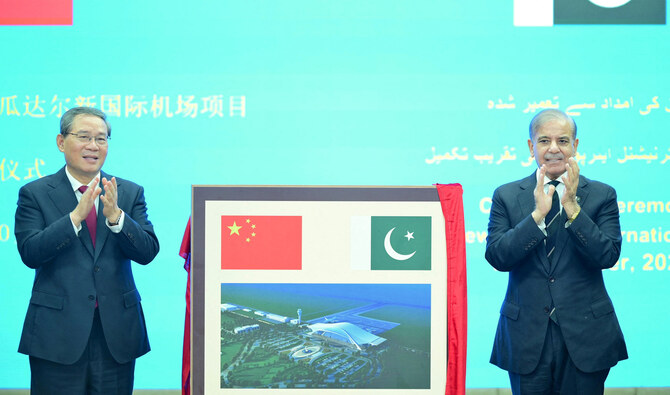ISLAMABAD: China and Pakistan have decided to accelerate development on the Gwadar Port in southwestern Balochistan, aiming to operationalize it as a hub for regional connectivity, according to a joint statement issued on Tuesday, with Beijing seeking “targeted security measures” to ensure a safer environment for bilateral cooperation.
The joint statement was released during Chinese Premier Li Qiang’s visit to Pakistan for the Shanghai Cooperation Organization (SCO) Summit.
The two countries have enjoyed a longstanding relationship, marked by strategic cooperation in trade, defense and infrastructure development. They have been collaborating on the China-Pakistan Economic Corridor (CPEC), a multibillion-dollar infrastructure and regional connectivity initiative, with plans to expand it by focusing on industrialization and socio-economic development.
However, China has stressed the need for heightened security for its workers in Pakistan following recent deadly suicide bombings against them.
“Recognizing the significance of the Gwadar Port as a key hub for cross-regional connectivity, the two sides reaffirmed their readiness to speed up the development of the auxiliary infrastructure of the Gwadar Port, to steadily attract more cargo shipments to the port, to find a solution to inadequate water and power supply at an early date, to accelerate the development of the port’s industrial zone, and to solidly enhance connectivity between the port and other parts of Pakistan,” the statement proclaimed.
Pakistan has offered the landlocked Central Asian states access to its ports in Gwadar and Karachi, enabling them to trade with the rest of the world via sea routes.
The Chinese premier also inaugurated the Chinese-funded airport in Gwadar virtually during his ongoing visit to Pakistan.
The joint statement also mentioned the recent conversations between China and Pakistan over the security issues, highlighting the concerns raised by Beijing.
“Acknowledging the efforts made by the Pakistani side to ensure the safety and security of Chinese personnel, projects and institutions in Pakistan, the Chinese side underscored the need and urgency to take targeted security measures in Pakistan, to jointly create a safe environment for cooperation between the two countries,” it said.
Militant groups targeting Pakistani civilians and security forces have also launched deadly attacks on Chinese workers in the past, killing a significant number of them in high-profile attacks.
Earlier this month, two Chinese engineers were killed in a massive explosion in Karachi only a few days before the arrival of China’s PM. This was the attack on Chinese workers in Pakistan since the beginning of the year.
The two countries also agreed to increase high-level official visit to discuss the progress on CPEC.
The Chinese side also reiterated its support for Chinese companies to invest in Pakistan’s Special Economic Zones.
China, Pakistan to fast-track Gwadar Port development, boost security for bilateral cooperation
https://arab.news/9x27v
China, Pakistan to fast-track Gwadar Port development, boost security for bilateral cooperation

- China seeks ‘targeted security measures’ from Pakistan after deadly attacks against its nationals
- Both sides agree to turn Gwadar into a key regional connectivity hub, develop its industrial zone



















